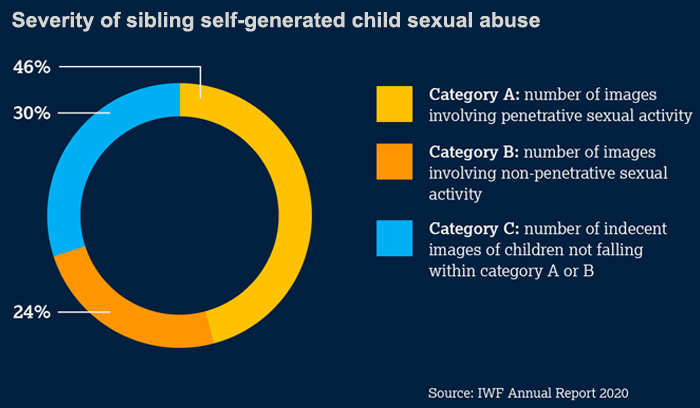‘Shocking’ rise in online predators grooming children to film abuse of friends and siblings
A new study has highlighted the “shocking scale” of internet sex predators tricking children into abusing friends and siblings online.
The Internet Watch Foundation (IWF) research reveals this “disturbing” trend is eight times worse than experts had feared.
The IWF said children as young as three years old appeared to be involved in abuse,
The study, published ahead of the IWF’s annual report, warns online sex predators are increasingly targeting children to have them abuse their siblings and friends, as well as themselves, on camera.
Often children were tricked into the abuse as a game or ‘dare’, with no evidence that they had any understanding of the sexual nature of what they were doing.
Susie Hargreaves OBE, chief executive of the IWF, said: “This tactic is emerging as a disturbing new trend in offender behaviour, and we know the youngest children are the most vulnerable, and often disproportionately suffer the worst kinds of abuse.
“Predators are now not only using the internet to contact, coerce, and abuse children – they are now using those children to get to other victims. Abuse often takes place in children’s own bedrooms, when parents think children are safe – playing with their siblings.”
The IWF has witnessed a rise in ‘self-generated’ child sexual abuse imagery being created and shared online, often after a child has been groomed, bullied or blackmailed by an adult.
A snapshot study of the three months between September 28 and December 23 by IWF analysts highlighted the scale of sex predators manipulating children into filming abuse involving other youngsters.
According to the study:
- 511 self-generated child sexual abuse images and videos assessed in this period were determined to involve siblings – the equivalent of eight images or videos each working day; and
- In 65 per cent of cases, one or both children engaged in direct sexual contact with the other.
Analysts said is clear that these children were manipulated or coerced into sexual activity by adults online via a live-stream and that these videos and snapshots were subsequently shared widely using a variety of different web platforms.
There is also evidence that some of these adults were posing as other children.
The data showed that 46 per cent of this material was Category A content showing the most severe forms of child sexual abuse, which can involve penetrative sexual activity, sexual activity with an animal, or sadism.
A further 24 per cent was determined to contain Category B material, while 30 per cent of the material was deemed to be Category C.
While in most cases with two children, one was slightly older – the average age of the youngest sibling was ten and the eldest 12 – there were some instances of more significant age differences of up to five years or more.
There are fears this new trend may indicate predators are actively seeking to abuse more children this way.
In February, David Wilson, a roofer from King’s Lynn in Norfolk, was handed a 25-year prison sentence for 96 child sex offences.
According to the National Crime Agency, Wilson’s crimes included grooming children over the internet into abusing their siblings and friends.
Ms Hargreaves said when analysts were asked to look into the issue, it had been expected they may see this kind of abuse once a day.
The numbers show analysts actually see sibling self-generated abuse imagery on average eight times a day.
Ms Hargreaves added: “The scale of the abuse has been particularly shocking. We know each image is a crime scene, and that all the children are real children.
“To see them coerced and bullied by dangerous predators into then abusing other children is beyond heart-breaking.
“Predators can approach children and strike up a conversation using internet connected devices without parents even being aware.”
The IWF is the UK-based charity responsible for finding and removing images and videos of children suffering sexual abuse from the internet.
The full study will appear in the IWF’s annual report, which is due to be published on April 21.



